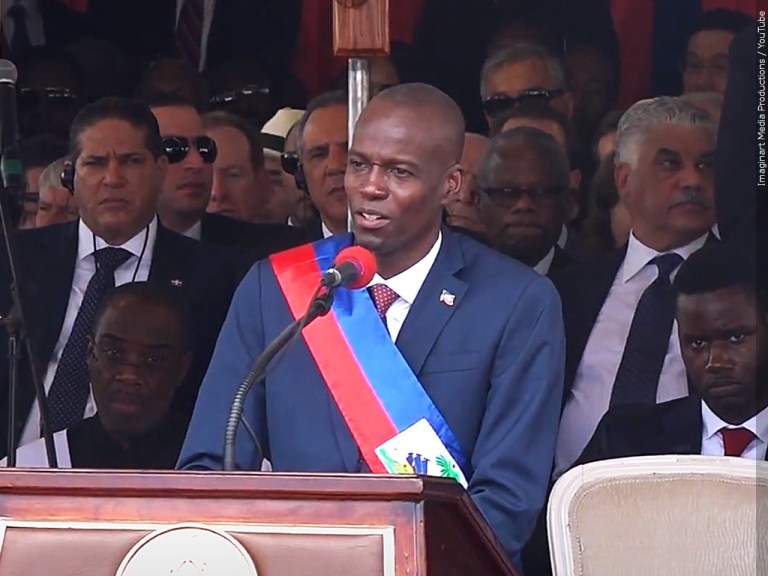Photo MGN.
This article first published 7/14/21 by the Minnesota Spokesman-Recorder https://spokesman-recorder.com/2021/07/14/haiti-in-turmoil-after-presidents-assassination/
Many suspect U.S meddling
Widely viewed as a puppet of the United States, Haiti’s President Jovenel Moïse was unpopular both among Haitians on the island and those who left. Still, the news of his assassination last week left Jacqueline Pierre-Paul, a 41-year-old Haitian American woman who lives in South Florida, overwhelmed with grief.
“In fact, I’m in tears now again for at least the tenth time in two days,” she told the MSR in a weekend interview. “I didn’t agree with his politics and the way he ran the country…[but] like many others I didn’t want him out this way. He was still our president, who was the head of a sovereign nation.”
But for all of her life, and that of her father and her father’s father dating back to President Woodrow Wilson’s decision to invade Haiti in 1915, the United States’ fingerprints are all over the Haitian body politic. And so Pierre-Paul experienced an emotion other than grief after learning of Moïse’s murder: rage.
Related story: Slain Haitian president faced calls for resignation, sustained mass protests before killing
“This type of chaos does nothing to improve the lives of my people,” said Pierre-Paul, who asked not to be identified by her real name for fear that it might jeopardize relatives in Haiti. “In fact, it opens the doors for more grifters, occupation, tyranny, and danger.
“The only ones who stand to gain from this are the same people who always have. My people are angry and we should be. The White saviors need to stay out of this.”
If social media and emigres such as Pierre-Paul are to be believed, Moïse’s assassination is not much of a whodunit on the Haitian street that stretches from Paris to Port Au-Prince, City Soleil to South Florida, and Bainet to Brooklyn. Despite adamant denials from the U.S. State Department, it is an article of faith for many Haitians that the U.S. bears some responsibility for the crack commando squad that stormed the presidential palace on the night of July 7. They tortured Moïse before opening fire on him and his wife, Martine, who was critically injured but survived the assault.
There is virtually no concrete evidence to support such accusations, but the U.S. does have a long criminal rap sheet in Haiti, which is the poorest country in the Western Hemisphere. Home to the first successful slave revolt in history, Haiti declared its independence from France in 1804.
But 21 years later, Napoleon demanded that the former slave colony repay France 150 million francs—10 times the amount the U.S. had paid for the Louisiana territory—as reparations. Banks in the U.S. were among those that loaned Haitians the money to meet their debt obligations.
When it looked as though Haiti might default, Wilson’s Secretary of State, William Jennings Bryan, deployed the Marines, putatively to protect U.S. citizens from civil unrest. Their real mission was to withdraw $500,000 from Haiti’s national bank.
In Haiti’s bicentennial year, 2004, President Jean Bertrand Aristide appealed to the international community for $22 billion in reparations; that same year, George W. Bush drove Aristide from office in what Aristide referred to as a coup d’etat. Seven years later, the Obama administration blocked the exiled Aristide’s return to Haiti to run for public office. He was the county’s most popular politician at the time.
The Obama administration’s choice to lead Haiti that year was Michel Martelly, a musician with no previous political experience. As president, Martelly—known as “Sweet Micky—dissolved Haiti’s parliament, reinstated the country’s military, and brokered deals with international businessmen and the Clinton Foundation that many Haitians would come to characterize as “corrupt.” Indeed, as Secretary of State, Hillary Clinton pressured Martelly to block a raise in the minimum wage for sweatshop workers.
Moïse was Martelly’s handpicked successor. In a YouTube video, last weekend, the Haitian-American human rights lawyer and activist Èzili Dantò repeated the widespread rumor that Haiti’s oligarchy of mixed-race businessmen targeted the president for assassination because he was cutting deals with foreign investors that squeezed them out of the picture.
Just recently, he met with investors in Turkey, which has a close relationship to Russia. Dantò and others surmised that this could not have made the Biden administration happy, as it ratchets up tensions with America’s Cold War rival.
“Guess who are responsible for Michelle Martelly?” said Danto. “It was Obama, Hillary Clinton…[Ambassador] Cheryl Mills, Susan Rice. Biden was the vice president. These people are responsible right now for the death of Jovenal Moise because without putting Martelly in the presidency Jovenal wouldn’t have been in the presidency and a lot of Haitians wouldn’t have died.”
Haitian police said on Sunday they had arrested one of the men suspected of organizing a unit of assassins formed of 26 Colombians and two Haitian Americans. National Police Chief Leon Charles told a news conference that 63-year-old Christian Emmanuel Sanon flew to Haiti on a private jet in early June accompanied by hired security guards. He had planned to take over as president.
Dantò and others don’t completely buy it, noting that Colombia and its conservative government is a client of the U.S. and that the assassination bore all the markings of a CIA false flag operation and a mob hit. Moise’s eyes were reportedly gouged out before he was fatally shot.
Said Dantò of the Biden administration’s commitment to assist Haiti in its investigation: “Haiti…needs no more help from the United States.”

